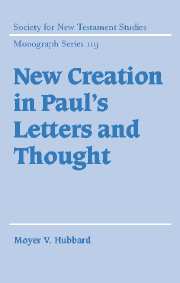Book contents
- Frontmatter
- Contents
- Acknowledgments
- List of abbreviations
- 1 Introduction: the current debate
- PART I NEW CREATION: CENTRAL JEWISH TEXTS
- Part II FROM DEATH TO LIFE: NEW CREATION IN THE CONTOURS OF PAUL'S THOUGHT
- Part III THE OLD AND THE NEW: NEW CREATION IN THE CONTEXT OF PAUL'S LETTERS
- 10 If anyone be in Christ: 2 Corinthians 5.17
- 11 Neither circumcision nor uncircumcision: Galatians 6.15
- 12 Summary and conclusions
- References
- Index of passages cited
- Index of modern authors
10 - If anyone be in Christ: 2 Corinthians 5.17
Published online by Cambridge University Press: 02 December 2009
- Frontmatter
- Contents
- Acknowledgments
- List of abbreviations
- 1 Introduction: the current debate
- PART I NEW CREATION: CENTRAL JEWISH TEXTS
- Part II FROM DEATH TO LIFE: NEW CREATION IN THE CONTOURS OF PAUL'S THOUGHT
- Part III THE OLD AND THE NEW: NEW CREATION IN THE CONTEXT OF PAUL'S LETTERS
- 10 If anyone be in Christ: 2 Corinthians 5.17
- 11 Neither circumcision nor uncircumcision: Galatians 6.15
- 12 Summary and conclusions
- References
- Index of passages cited
- Index of modern authors
Summary
But to find a man who in plain terms and without guile speaks his mind with frankness … is not easy, but rather the good fortune of every great city, so great is the dearth of noble, independent souls and such is the abundance of toadies, mountebanks and sophists.
Dio Chrysostom, DiscoursesThe literary context of 2 Corinthians 5.11–21
The unity of the document we now possess as 2 Corinthians was much debated in the twentieth century, and even now the question is far from settled. Yet in spite of the lack of consensus on the composition of canonical 2 Corinthians, no one doubts the unity of 2.14–7.4 (6.14–7.1 excepted). The argument of this chapter is not dependent on any particular literary reconstruction of 2 Corinthians, nor can the unity of this letter be positively excluded. In what follows I will assume that chapters 1–9 belong together, and leave open the question of 6.14–7.1. Chapters 10–13 will be used critically to inform this (probably earlier) material, but only when specific data in both segments can be correlated in such a way as to warrant this. Given these general assumptions, the connection between 2.14ff. and what precedes deserves comment.
The transition from 2.13 to 2.14 is abrupt, though it is not unreasonable to suppose that the thanksgiving period of 2.14–17 was occasioned by the mention of Titus in 2.13. Paul resumes this line of thought in 7.5, where we discover the reason for his sudden outburst of thankfulness: he was overjoyed by the reception Titus had received from the Corinthians (7.5–16).
- Type
- Chapter
- Information
- New Creation in Paul's Letters and Thought , pp. 133 - 187Publisher: Cambridge University PressPrint publication year: 2002

